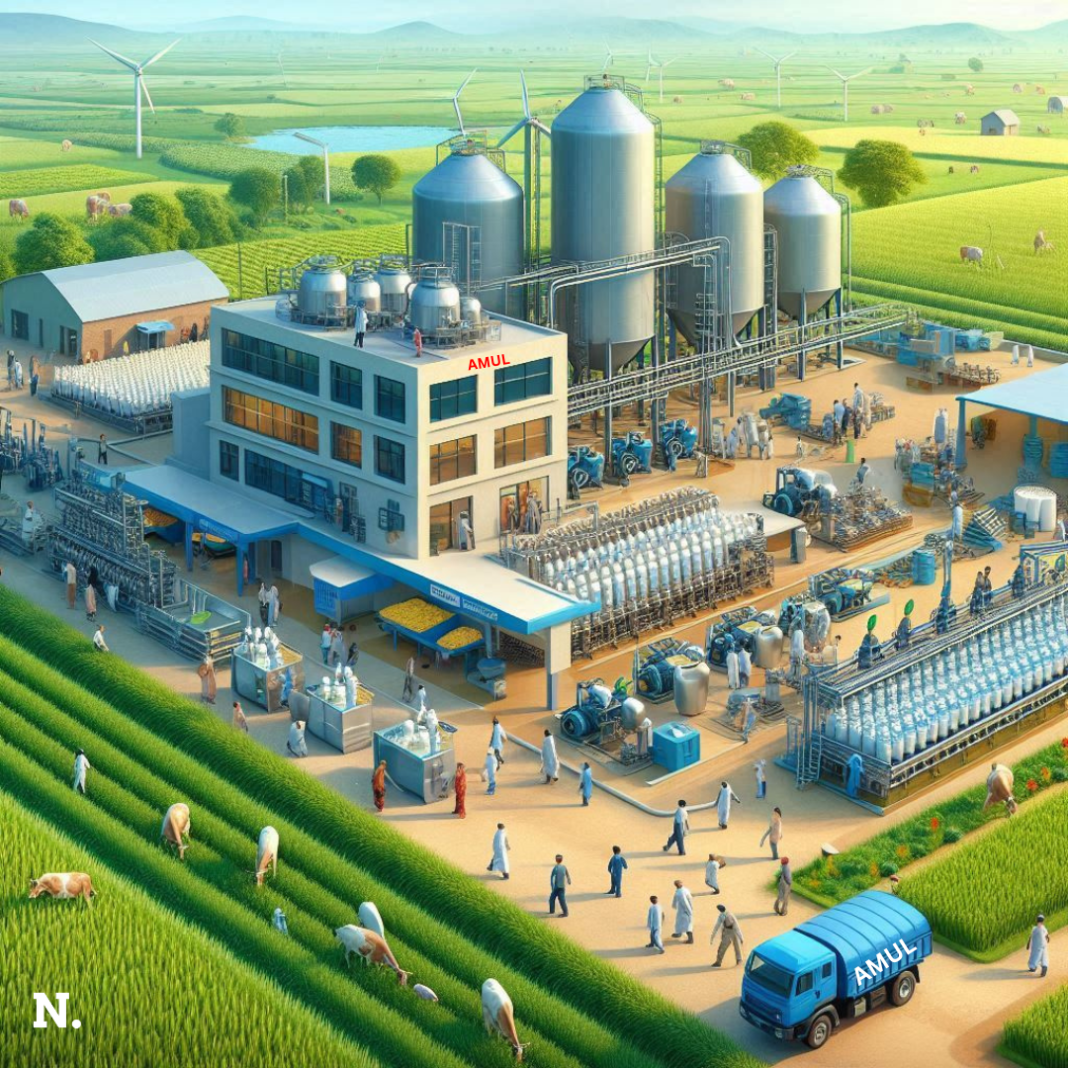Amul’s Journey: From Dairy to Global Leadership
Amul, which began as a small dairy cooperative in India, has grown into one of the world’s largest dairy producers. Its success story is based on a simple but powerful model: cooperation among farmers. Founded on the principles of a cooperative business, Amul has been instrumental in transforming India from a milk-deficient nation to the world’s largest milk producer. Today, Amul collects over 31 million litres of milk every day from its 107 dairy plants spread across India. More than 16 million milk producers contribute to Amul’s supply chain through 1,85,903 village-level cooperative societies.
The uniqueness of Amul’s model is that it is not just another business focused on profit. Amul is owned by farmers themselves, with 36 lakh farmers being its backbone. The focus is on meeting the needs of both the producers (farmers) and the consumers, not just driving profits. Amul’s structure allows farmers to have control over the entire process—from collecting milk to processing and distributing it. This way, farmers receive fair returns for their milk, and consumers get high-quality dairy products at reasonable prices.
Through this cooperative model, Amul has become a major player in India’s dairy industry, contributing significantly to its growth. India’s milk production has been increasing at a rate of 6% per year for the last few years, whereas the global growth rate is only 2%. This shows how the Amul model has helped the country achieve self-sufficiency in milk production and beyond. Amul also sells 22 billion packs of products annually and has expanded its range to include over 50 different items, generating ₹80,000 crores in revenue in the financial year 2024.
Expanding Amul’s Cooperative Model Worldwide
Amul’s success in India has encouraged it to replicate this cooperative model in other countries. Already present in Sri Lanka, Africa, and the United States, Amul is looking to enter new markets such as Europe. In the US, Amul has partnered with the Michigan Milk Producers Association (MMPA), focusing on managing milk collection and processing while Amul leads branding and marketing.
Similarly, in Sri Lanka, Amul has been working closely with local dairy boards to help the country become self-sufficient in milk production. The cooperative model ensures that local farmers benefit from Amul’s entry, as they become part of the larger supply chain, just like in India. With the success in these regions, Amul’s CEO has expressed a keen interest in expanding further into the European market.
Amul’s global ambitions are grounded in its ability to maintain a low-cost model while ensuring high-quality products. By entering foreign markets, Amul aims to replicate the success of its Indian cooperative system, offering local farmers opportunities to benefit from its extensive expertise and vast distribution network. This approach ensures that Amul’s products remain affordable and accessible, even as it scales internationally.
Diversification and Growth Beyond Dairy
While dairy has been Amul’s core business, the company is actively expanding into new areas. One of the most significant developments is its entry into biogas production. Farmers who traditionally collect milk for Amul can now earn extra income by selling cow dung, which they then process into biogas. They are applying the same three-tier cooperative model used for collecting, processing, and marketing milk to cow dung, with plans to commercialize biogas by setting up CNG pumps.
Moreover, Amul is diversifying its product range beyond traditional dairy items. It has ventured into high-protein products such as yogurt, buttermilk, and shakes, along with ice cream, cookies, and chocolate. In addition to these, Amul is also eyeing opportunities in other fast-moving consumer goods (FMCG) sectors. This includes staples like wheat flour, rice, pulses, sugar, spices, and tea. By leveraging its cooperative model, Amul can route these products from farmers to consumers efficiently.
To further capitalise on its brand recognition, Amul is venturing into the ready-to-eat market. Plans to introduce ready-to-serve meals such as pav bhaji, pizza, sandwiches, and burgers are already in the pipeline. Amul’s cafes, known as Cafe Amul, offer quick service and dining options, allowing consumers to enjoy a variety of Amul products in a casual setting. The company also operates ice lounges in several cities, where it sells its popular ice creams in a premium setting. These lounges are set to expand across India, and Amul has plans to launch similar lounges in international markets through a combination of franchising and in-house control.
Amul’s Impact on the Dairy Industry
Amul’s model is not only beneficial for its farmers but also plays a key role in supporting the entire dairy ecosystem. India is currently the largest producer of milk globally, accounting for 22% of the world’s milk production. Thanks to Amul’s contributions, India’s milk production continues to grow, and the country is poised to account for one-third of global milk production by 2030.
With its cooperative model, Amul has ensured that the benefits of this growth are shared equally among farmers, processors, and consumers. As India’s largest dairy producer, Amul has the infrastructure and capacity to drive the sector forward. Its success is a testament to the power of collective action, where small farmers can come together and create a thriving enterprise.
Amul has revolutionized India’s dairy industry through its cooperative model. Now, it aims to replicate this success on a global scale. Whether it’s dairy products, biogas, or FMCG, Amul has a grand plan. The company seeks to compound its cooperative model to benefit millions of farmers, consumers, and businesses worldwide. Its journey from a regional dairy cooperative to a global powerhouse is remarkable. This success story demonstrates how cooperation and innovation can lead to sustainable growth.





